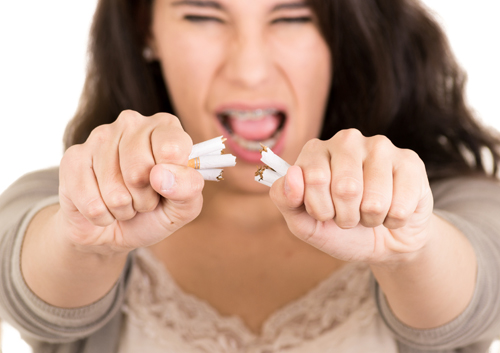How do I avoid bad breath?
July 9th, 2014

At Kenneth Sloane, DDS, we see a lot of patients who are concerned about their bad breath, also known as halitosis. So today we thought we would educate our patients about what you can do to keep your pearly whites clean and your breath minty fresh!
Naturally, good oral hygiene on your part is the first step. With proper brushing and flossing you can keep halitosis in check. Even though you may have done an excellent job of brushing and flossing your teeth, if you fail to brush your tongue, you may still have bad breath. Bad breath is caused by odor-producing bacteria that grow in your mouth. Certain foods, medications, smoking, sinus issues, or even gum disease can cause bad breath.
Besides proper brushing and flossing, bad breath can be prevented if you:
Stop smoking/chewing tobacco-based products: Ask Dr. Kenneth Sloane and our team for tips on kicking the habit.
Keep your mouth hydrated: Because a dry mouth typically leads to bad breath, drinking water or eating oranges or celery may help.
Visit our Closter, NJ office for regular dental checkups: By visiting Kenneth Sloane, DDS at least twice a year, you will keep bad breath at bay. Dr. Kenneth Sloane will conduct an oral exam and will be able detect and treat periodontal disease, dry mouth, or other problems that may be the cause of bad mouth odor.
Fun Facts for the Fourth
July 2nd, 2014

The Fourth of July is a great time to get together with friends and family members for BBQ, games, fireworks, and other celebrations in honor of our country’s independence. While your fellow revelers eat hot dogs and wave flags, you can impress them by sharing these fascinating facts and historical tidbits about some of our country’s traditions and symbols from the team at Kenneth Sloane, DDS.
The Statue of Liberty
With a torch in one hand and a tablet in the other, the Statue of Liberty is one of the most iconic and recognizable symbols of our country. However, as recognizable as certain parts of the statue are, not many people know that broken shackles, which represent oppression and tyranny, are lying at Lady Liberty’s feet. According to the Statue of Liberty-Ellis Island Foundation, the copper-plated lady weighs in at a whopping 450,000 tons and has been holding her torch up for more than 125 years, which must make for some impressive arm muscles.
Nathan’s Hot Dog Eating Contest
Since 1916, people have been flocking to Coney Island on the Fourth of July to witness what some people call the “superbowl of competitive eating.” Nathan’s Hot Dog Eating contest challenges competitors to devour as many hot dogs as they can in just ten minutes, with the current record holder swallowing a whopping 68 hot dogs! If you’d like to witness this bizarre and frenzied eating competition but you won’t be anywhere near Coney Island on the fourth, don’t worry. ESPN has been broadcasting this popular event for several years, so you can watch from the comfort of your couch while you eat a reasonably portioned meal.
The History Behind Fireworks
Viewing the nighttime fireworks display is exciting way to finish off the fourth. Many people know that these brilliant displays probably originated with the Chinese. However, many historians also believe that fireworks were stumbled upon when the Chinese roasted bamboo sticks over fires and watched them explode. After many years of roasting the sticks, a group of alchemists created an early form of gunpowder, which they stuffed into the bamboo sticks to create an even more powerful explosion, paving the way for the today’s modern fireworks.
Whether you’re planning on visiting the Statue of Liberty, watching fireworks in Closter, NJ, or even participating in a hot dog eating contest, Dr. Kenneth Sloane and our team hope you have a safe and fun-filled holiday. Happy Fourth of July!
How Sedation Dentistry Can Help You Overcome Dental Anxiety
June 25th, 2014

Putting off your dental visit to Kenneth Sloane, DDS because of fear or anxiety only increases the potential for tooth decay or gum problems. At our office, Dr. Kenneth Sloane and our team offer solutions that allow you to relax, without any pain, so you can keep your mouth healthy. Our solutions can help with many different anxiety issues for both adults and children.
Help with minor anxiety
Nitrous oxide is an excellent choice for most patients. Sometimes referred to as laughing gas, nitrous oxide can be regulated to provide you with the amount of sedation you need. When used before a local anesthetic, the injection will not be uncomfortable and you should not notice any pain during your procedure.
If you plan to use nitrous oxide, you can drive yourself to your appointment. In most cases, you will be fine to drive after your treatment: the sedation wears off quickly. Nitrous oxide can also be used along with other sedation techniques to produce a higher level of sedation.
Oral sedatives are available in a liquid or pill form. If you experience moderate anxiety levels, you can be given a tablet to take before your appointment. This type of sedation will be beneficial in relieving the anxiety that can build before your procedure. However, if you choose this method, you cannot drive yourself to your appointment.
Help with major dental anxiety
If you experience extreme levels of stress and anxiety about dental treatment, you may wish to discuss deep sedation or general anesthesia. With these techniques, you will be barely conscious or unconscious during your procedure. You will not feel discomfort or pain. Once you have experienced dentistry with a sedation technique, your anxiety level may decrease on its own.
People are not born with the fear of a dental exam. Unfortunately, most anxiety issues are due to a bad dental experience or childhood trauma. Sometimes anxiety comes from listening to the tales of others, who may have exaggerated their story. Talk to Dr. Kenneth Sloane and our team about your dental concerns or fears. Let us help you so you can get the dental care you need for a healthy mouth for life.
For more information about overcoming dental anxiety, or to schedule an appointment with Dr. Kenneth Sloane, please give us a call at our convenient Closter, NJ office!
How Smoking Increases the Risk of Oral Cancer
June 18th, 2014

Cigarette smoke contains more than 6,000 chemicals, and at least 200 of those chemicals are known to be harmful to your health. When smoke is inhaled, moist oral tissues are saturated with excessive amounts of carbon monoxide, hydrogen cyanide, and a host of other known carcinogens. Most oral cancers originate in abnormal squamous cell activity, which are cells found on the lips, inside the mouth, and in the throat.
How Oral Cancer Begins
Cells exposed to consistently high levels of cigarette smoke may eventually suffer abnormal mutations within their DNA. Since deoxyribonucleic acid (DNA) is responsible for providing cells with instructions about growth, reproduction, and death, these instructions become distorted, which causes the cells to reproduce uncontrollably.
Essentially, that is what cancer is: rapid, unchecked growth of genetically mutated cells that encourages the development of malignant tumors. Unfortunately, the chemicals in cigarette smoke are strongly associated with oral cancer.
Signs of Oral Cancer
Early-stage oral cancer is often asymptomatic, which means symptoms appear only after the cancer intensifies and spreads. Possible signs of oral cancer include:
- Ulcers inside the mouth or on the lips that do not heal
- White or dark red patches inside the mouth
- Lumps inside or around the mouth (a lump could appear on your neck)
- Bleeding, numbness, and soreness in the mouth
- Chronic halitosis
- Loose teeth in the absence of tooth decay
Diagnosis and Treatment of Oral Cancer
Squamous cell oral cancer is the most common type diagnosed in smokers. Dr. Kenneth Sloane and our staff often discover squamous cell carcinoma lesions during dental examinations or cancer screenings. Depending on the stage of the oral cancer, treatment may begin with a biopsy or an exfoliative cytology procedure that involves collecting cells from the oral cavity using a scraper.
According to the Oral Cancer Foundation, oral cancer patients may need surgery, radiation therapy, a combination of surgery and radiation therapy, or chemotherapy to eradicate oral cancer.
Smoking, Cancer, and Tooth Decay
Not only is smoking the number-one cause of cancer but it is also detrimental to the overall health of your teeth and gums. Yellow teeth, bad breath, dry mouth, and expedited tooth decay are all caused by smoking, not to mention the damage smoke does to the heart, lungs, and kidneys.
In other words, don’t smoke!






